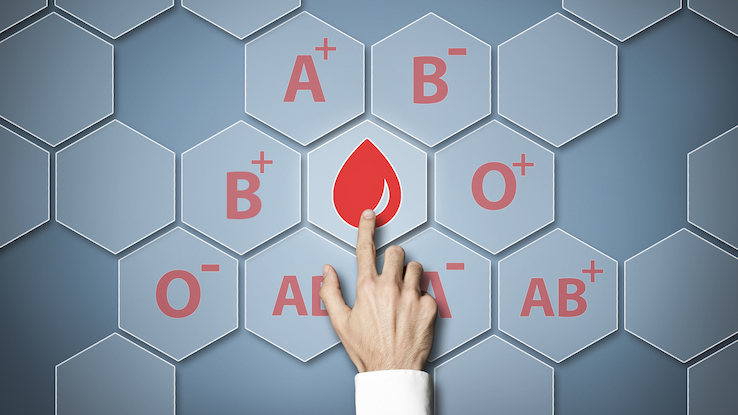
There are a million and one fad diets out there — and many promise to personalize your diet plan so that it’s just right for you. You may have heard of a diet plan that claims to work according to your blood type. So, does the blood type diet work?
What Is the Blood Type Diet?
The blood type (or blood group) diet is a program that was made popular by naturopath Peter D’Adamo’s 1996 book Eat Right 4 Your Type. The central idea behind this book is that the reason certain diets work better for different people is because of differences in blood type: A, B, O or AB.
D’Adamo claims that eating or avoiding specific foods according to your blood type can improve digestion, help maintain a healthy weight and prevent diseases. The theory behind the diet is that blood type is linked to our ability to digest certain types of foods. D’Adamo suggests that each blood type represents genetic traits and dietary habits from ancient humans at the time when that blood type first evolved (like hunter-gatherers vs. agriculturalists).
But there are some obvious problems with this theory. There’s no proven connection between blood type and digestion. And experts don’t agree about which blood type evolved first in early humans. So overall, there’s a lack of evidence behind this diet approach.
What Are the Rules for Each Blood Type?
Here’s the gist of the guidelines for each blood type:
- Type A blood: Eat mostly plant-based foods including fruits, vegetables, whole grains, beans and legumes. D’Adamo claims that people with type A blood have trouble digesting animal proteins and fat, so he advises them to avoid all red meat and dairy. This diet most closely resembles a vegetarian diet, although it allows some animal products, including poultry and seafood.
- Type B blood: Eat a mix of plant and animal products but avoid specific foods, including chicken, pork, wheat, corn, lentils, peanuts, bread, tomatoes and coffee. This diet is similar to a paleo diet, but it doesn’t limit dairy products.
- Type AB blood: Eat a variety of seafood, fresh produce and green vegetables, soy products, dairy, most grains and turkey. Avoid red meat, chicken, kidney beans, corn, buckwheat, alcohol and caffeine. This one is somewhere in between Type A and Type B.
- Type O blood: Eat a high-protein, low-carb diet with a lot of lean meats, fish, certain fruits and vegetables, and full-fat dairy in moderation. Avoid grains, legumes and most fruits. This diet also closely resembles a modern paleo diet.
Is There Any Evidence That This Diet Works?
No. There’s no scientific evidence to support the claims of the blood type diet.
While there’s some evidence that people with certain blood types may have a higher risk for certain illnesses, there’s no evidence that eating a diet tailored to your blood type has any effect on these conditions.
For example, a 2013 review looked at all the available evidence and found that there were no studies to support the proposed health benefits of blood type diets. Several studies have found that people who follow blood type diets have positive health outcomes like lower blood pressure and cholesterol levels — but that these effects have nothing to do with their blood type.
Here’s the simplest and most likely explanation for these results: All 4 versions of the blood-type diet involve a shift away from a typical Western diet high in processed and calorie-dense foods. For the most part, they guide people toward a more nutritionally balanced, plant-based diet with fewer overall calories.
So while people who follow the blood-type diet may notice some positive health effects, it has nothing to do with their blood type.
So, Bottom Line: Is There Any Reason to Try a Blood Type Diet?
Not really. Our advice: Take the good and leave the rest.
There are some good things about the blood-type diet. In general, it follows sound principles of healthy eating and nutrition, like an emphasis on whole foods and plant-based products.
But there are also downsides to blood-type diets. They’re highly restrictive in what you can and can’t eat, which means they’re probably unsustainable for most people. And depending on your blood type and which foods the diet tells you to avoid, you may risk missing out on important nutrients.
Also, as we noted above, there’s simply no evidence that your blood type affects what types of foods are best for you. So you can probably get similar results through other eating styles that aren’t as restrictive.
There are many other diets out there that have been designed by dietitians and nutritionists, and that have scientific evidence to support their claims. A recent review of the scientific evidence of diets for weight loss found that different popular diets like low-carb diets, plant-based diets and the Mediterranean diet all promote similar weight loss outcomes.
This review also found that the best predictor of success is staying on the diet in the long term. So the key is finding a diet that works for you and your lifestyle and sticking with it.
Resource Links:
- “Diet not working? Maybe it’s not your type” via Harvard Health
- “Blood type diets lack supporting evidence: a systematic review” via American Journal of Clinical Nutrition
- “ABO Genotype, ‘Blood-Type’ Diet and Cardiometabolic Risk Factors” via PLoS One
- “ABO Genotype Does Not Modify the Association between the ‘Blood-Type’ Diet and Biomarkers of Cardiometabolic Disease in Overweight Adults” via The Journal of Nutrition
- “Blood Type Is Not Associated with Changes in Cardiometabolic Outcomes in Response to a Plant-Based Dietary Intervention” via Journal of the Academy of Nutrition and Dietetics
- “Scientific evidence of diets for weight loss: Different macronutrient composition, intermittent fasting, and popular diets” via Nutrition





